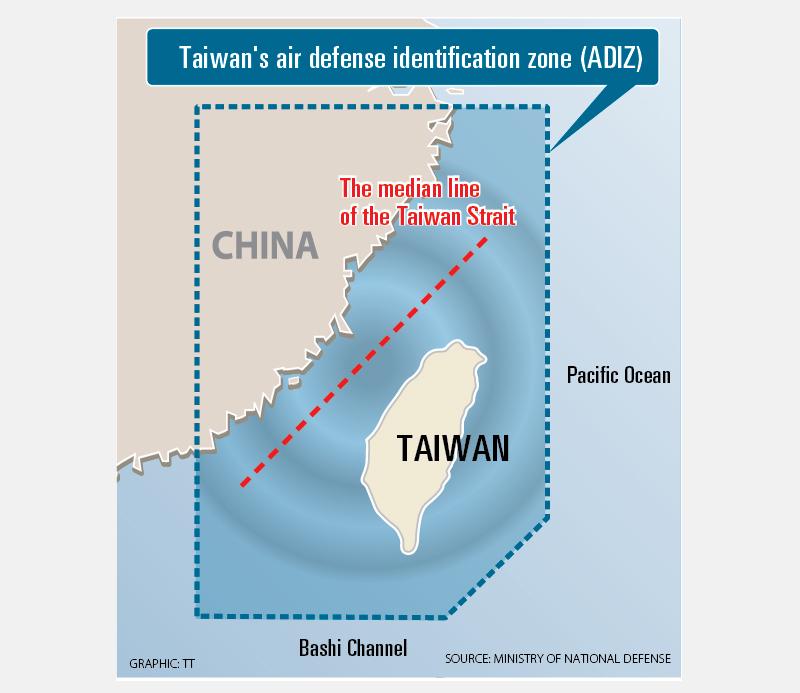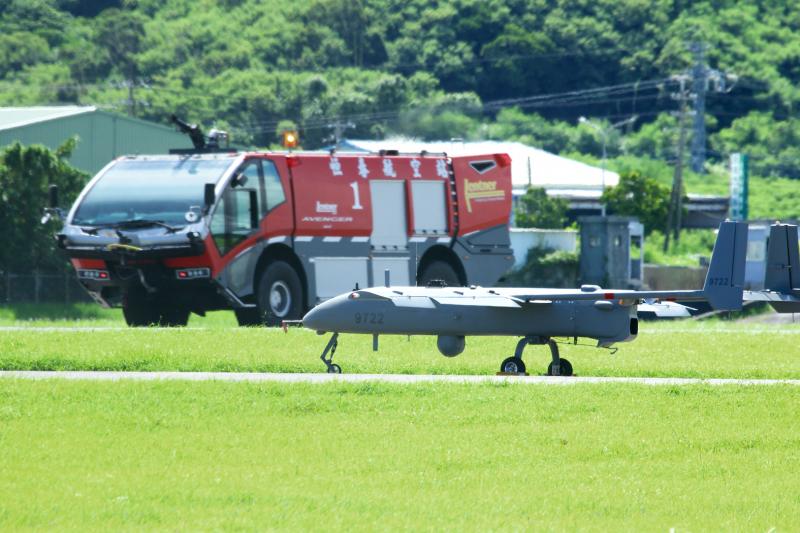Taiwan should pay close attention to whether China will normalize military drills around the nation, experts said yesterday, adding that the military must devise coping strategies.
China from Thursday to yesterday conducted its largest-ever military exercises around Taiwan in retaliation for a visit last week by US House of Representatives Speaker Nancy Pelosi, who is the highest-ranking US official to visit Taiwan in 25 years.
Although the nation’s armed forces have won public support by condemning the Chinese People’s Liberation Army (PLA) for bullying Taiwan, the military should bolster its capabilities, Institute of National Defense and Security Research research fellow Su Tzu-yun (蘇紫雲) said yesterday.

For example, while Taiwan has certain levels of food and energy reserves, in the event of a Chinese blockade, the nation would need naval vessels that can break through the siege and escort cargo ships, he said.
The military should continue to improve its missile technology and develop asymmetric and conventional warfare capabilities, he added.
Chinese commentators had said the latest drills could invalidate the median line of the Taiwan Strait, as well as Taiwan’s territorial waters and its energy lifeline, adding that the PLA could establish lockdown zones, no-fly zones and war patrol zones.

Photo: Chen Yen-ting, Taipei Times
Su said that the drills could not achieve any of those goals, adding that entering Taiwan’s territorial waters is not easy and the nation would protect its energy lifelines if a war were to break out.
“Beijing should not misjudge the situation,” he added.
Security experts have said Chinese military planners have long discussed a blockade of Taiwan, but most likely see such a move as too provocative.
During the latest drills, China fired missiles over Taipei, flew drones over Taiwan’s outlying islands, sent warships across the median line of the Strait and virtually surrounded Taiwan proper in what the nation’s military said amounted to a “blockade practice.”
“These actions in effect changed the status quo of Taiwan’s security,” said Li Mingjiang (李明江), an associate professor at the S. Rajaratnam School of International Studies in Singapore.
“This gives China’s military a new basis from which to push more boundaries in future exercises,” he said.
The show of capability and resolve comes from a PLA that is far more formidable than the one during the Third Taiwan Strait Crisis in 1996, the last time it fired missiles into waters near Taiwan.
Although Taiwanese, jaded by decades of Chinese threats, appeared unfazed by the drills, some observers said Taiwan’s military leaders might be worried.
Chang Jung-feng (張榮豐), who was deputy secretary-general of the National Security Council during the 1996 crisis, told local media that the drills could be a preview of a Chinese invasion scenario.
Although China might have edged closer to using force against Taiwan, most experts do not believe a war is imminent.
“Invasion within this decade is far from certain to succeed. Failure would spell the end of [Chinese President] Xi Jinping (習近平), his dream and possibly the Chinese Communist Party,” said Charles Parton, a retired British diplomat.
Xi, who has not spoken publicly about Pelosi’s visit, but as chairman of the Central Military Commission is effectively the PLA’s commander-in-chief, would be well aware of the risks of action, experts say.
“China would have hoped that these drills could somehow stop the trend of the US, Europe and many other countries becoming more sympathetic to Taiwan,” Li said. “So far, that effect remains to be seen.”

RESOLUTIONS DEBATE: Taiwan’s allies said that UN and WHA resolutions cited by China and other nations ‘do not determine Taiwan’s participation in WHO activities’ A proposal to invite Taiwan to this year’s World Health Assembly (WHA) was rejected on Monday, resulting in Taipei’s absence from the annual meeting for a ninth consecutive year, although partners spoke up for Taiwan’s participation at the first day of the meeting. The first agenda item after the opening was a “two-on-two debate” on a proposal to invite Taiwan to participate at the WHA as an observer. Similar to previous years, two countries made statements in favor of the proposal, while two others expressed their opposition. Philippine Secretary of Health Teodoro Herbosa, president of the 78th WHA, accepted the WHA General Committee’s

Palauan President Surangel Whipps Jr arrived in Taiwan last night to kick off his first visit to the country since beginning his second term earlier this year. After arriving at Taoyuan International Airport at around 6:30 pm, Whipps and his delegation were welcomed by Minister of Foreign Affairs Lin Chia-lung (林佳龍). Speaking to gathered media, the Palauan leader said he was excited and honored to be back in Taiwan on his first state visit to Taiwan since he was sworn in this January. Among those traveling with Whipps is Minister of State Gustav N. Aitaro, Public Infrastructure

Premier Cho Jung-tai (卓榮泰) on Friday laid out the Cabinet’s updated policy agenda and recapped the government’s achievements ahead of the one-year anniversary of President William Lai’s (賴清德) inauguration. Cho said the government had made progress across a range of areas, including rebuilding Hualien, cracking down on fraud, improving pedestrian safety and promoting economic growth. “I hope the public will not have the impression that the Cabinet only asked the legislature to reconsider a bunch of legal amendments,” Cho said, calling the moves “necessary” to protect constitutional governance and the public’s interest. The Cabinet would work toward achieving its “1+7” plan, he said. The

Nvidia founder and CEO Jensen Huang (黃仁勳) hosted a dinner in Taipei last night with key Taiwanese suppliers to celebrate the successful mass production of the company’s new Blackwell AI systems. Speaking to the media earlier yesterday, Huang thanked Nvidia’s Taiwanese partners for their contributions to the company’s ecosystem, while also sharing his plans to meet with Taiwan Semiconductor Manufacturing Co (TSMC) founder Morris Chang (張忠謀). In response to rumors that Nvidia will launch a downgraded Hopper H20 chip for China in July, Huang dismissed the reports, saying, “That is not true.” He clarified that there